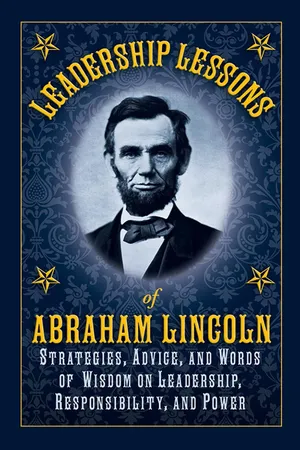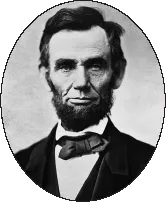![]()
CHAPTER 1
TO LABOR WITH
PURPOSE AND
SUCCEED WITH
DISCIPLINE
“Leave nothing for tomorrow
which can be done today.”
A man, nameless to the annals of history except for a random chance of geographic proximity, once dared to look beyond the veil of martyred hindsight to remember a lanky yet surprisingly strong young man from Kentucky, “Abe Lincoln worked for me … didn't love work half as much as his pay. He said to me one day that his father taught him to work, but he never taught him to love it.”
This charmingly unsentimental anecdote fits with what little is known about Lincoln's early years. Other neighbors interviewed years after Lincoln's death would recall watching Abe helping his father on the farm. The tall youth was known to faithfully, if not quite enthusiastically, perform the backbreaking labor required to survive on the frontiers of Kentucky, Indiana, and eventually Illinois.
No one would say Lincoln ever shied away from hard work; instead he saw physical labor as a means to an end. In his youth, that end was most often the chance stick his nose back in a book. As Lincoln grew in both wisdom and age, that end would become a defining and unshakable principle: the Union must be saved.
Lincoln's personal experiences as a “hired hand,” lawyer, and eventually a politician, allowed him to develop a unique perspective on the American struggle to earn a living. For all the promise of opportunities and hope of the New World, few individuals in nineteenth-century America were truly able to rise above the standard of living they were born into. Even fewer were able to successfully navigate through both the spheres of physical laborer and intellectual professional. Though Lincoln undoubtedly enjoyed his career as a politician more than his life on the frontier, it can be argued he was definitely successful in both arenas.
The future president earned his first dollar ferrying passengers across the Ohio River on a raft he built himself. In the years that followed he worked his way up from hired hand to store clerk for one Mr. Denton Offutt. Eventually Lincoln was known as one of the most popular lawyers to travel the Illinois circuit court; whether he won or lost a case, he could always be counted on to tell a captivating yarn to the other legal professionals gathered around the inn hearth at night. Most obviously, as a politician, Lincoln attained the highest and most powerful civilian office in the country.
Impossible as it is to try and isolate one root cause for Lincoln's success, several themes do become obvious in his words below. Whether affixing his signature to a new law, swinging an axe above his head, or passionately calling a nation to arms, Lincoln was a man who diligently persevered. When there was a task to finish, he followed through; when there was a case to be won, he argued with passionate honesty; when there was a nation to save, he bore down with grit and determination.
Diligent Habits
Nothing valuable can be lost by taking time. If there be an object to hurry any of you in hot haste to a step which you would never take deliberately, that object will be frustrated by taking time; but no good object can be frustrated by it.
—Lincoln's First Inaugural Address;
March 4, 1861
You are not lazy, and still you are an idler. I doubt whether, since I saw you, you have done a good whole day's work in any one day. You do not very much dislike to work, and still you do not work much, merely because it does not seem to you that you could get much for it. This habit of uselessly wasting time is the whole difficulty; it is vastly important to you, and still more so to your children, that you should break the habit. It is more important to them, because they have longer to live, and can keep out of an idle habit before they are in it, easier than they can get out after they are in.
—Letter to J. D. Johnston; January 2, 1851
Some poet has said “Fools rush in where angels fear to tread.” At the hazard of being thought one of the fools of this quotation, I meet that argument, I rush in, I take that bull by the horns.
—Reply to Stephen Douglas; October 16, 1854
If you intend to go to work, there is no better place than right where you are; if you do not intend to go to work you cannot get along anywhere. Squirming and crawling about from place to place can do no good.
—Letter J. D. Johnston; November 4, 1851
There may be some inequalities in the practical application of our system ….There may be mistakes made sometimes; and things may be done wrong, while the officers of the Government do all they can to prevent mistakes. But I beg of you, as citizens of this great Republic, not to let your minds be carried off from the great work we have before us. This struggle is too large for you to be diverted from it by any small matter.
—Address to the 164th Ohio Regiment;
August 18, 1864
The advice of a father to his son “Beware of entrance to a quarrel, but being in, bear it that the opposed may beware thee” is good, and yet not best. Quarrel not at all. No man resolved to make the most of himself can spare time for personal contention. Still less can he afford to take all the consequences, including the vitiating of his temper, and the loss of self-control.
—Letter to Capt. James M. Cutts;
October 26, 1863
Cultivating a Successful Work Ethic and Mentality
Important principles may and must be inflexible.
—Lincoln's last public address;
April 11, 1865
Happy day, when, all appetites controlled, all poisons subdued, all matter subjected, mind, all conquering mind, shall live and move the monarch of the world. Glorious consummation! Hail fall of Fury! Reign of Reason, all hail!
—Address to the Washington Temperance Society;
February 22, 1842
Always bear in mind that your own resolution to succeed, is more important than any other one thing.
—Letter to Isham Reavis; November 5, 1855
Of course I would have preferred success; but failing in that, I have no regrets for having rejected all advice to the contrary, and resolutely made the struggle.
—Letter to Judge S. P. Chase; April 30, 1859
There may sometimes be ungenerous attempts to keep a young man down; and they will succeed, too, if he allows his mind to be diverted from its true channel to brood over the attempted injury.
—Letter to W. H. Herndon; July 10, 1848
All creation is a mine, and every man, a miner. The whole earth, and all within it, upon it, and round about it, including himself, in his physical, moral, and intellectual nature, and his susceptibilities, are the infinitely various “leads” from which, man, from the first, was to dig out his destiny.
—Lecture on Discoveries and Inventions;
April 6, 1858
Now, as to the young men. You must not wait to be brought forward by the older men.
—Letter to W. H. Herndon; June 22, 1848
Determination and Self–Control
You can not fail in any laudable object, unless you allow your mind to be improperly directed.
—Letter to W. H. Herndon; July 10, 1848
But yet it is folly to undertake works of this or any kind, without first knowing that we are able to finish them, as half-finished work generally proves to be labor lost.
—Open letter to the People of Sangamo County; March 9, 1832
Every man is proud of what he does well; and no man is proud of what he does not do well. With the former, his heart is in his work; and he will do twice as much of it with less fatigue. The latter performs a little imperfectly, looks at it in disgust, turns from it, and imagines himself exceedingly tired. The little he has done, comes to nothing, for want of finishing.
—Address to the Wisconsin State Fair;
September 30, 1859
Work, work, work, is the main thing.
—Letter to John M. Brockman;
September 25, 1860
If anyone, upon his rare powers of speaking, shall claim an exemption from the drudgery of the law, his case is a failure in advance.
—Fragment; written circa July 1850
Will springs from the two elements of moral sense and self-interest.
—Speech given in reaction to the
Dred Scott decision; June 26, 1857
It behooves you to be wide awake and actively working.
—Letter to Joseph Gillespie;
July 16, 1858
Advancement—improvement in condition—is the order of things in a society of equals. As labor is the common burden of our race, so the effort of some to shift their share of the burden on to the shoulders of others is the great durable curse of the race.
—Fragment; written circa July 1854
You have confidence in yourself, which is a valuable, if not an indispensable quality. You are ambitious, which, within reasonable bounds, does good rather than harm.
—Letter to Maj. Gen. Hooker;
January 26, 1863
Towering genius disdains a beaten path. It seeks regions hitherto unexplored.
—Speech to the Young Men's Lyceum;
January 27, 1838
Work and Labor
I am always for the man who wishes to work.
—Endorsement for employment application;
August 15, 1864
Labor is the great source from which nearly all, if not all, human comforts and necessities are drawn.
—Speech at...


